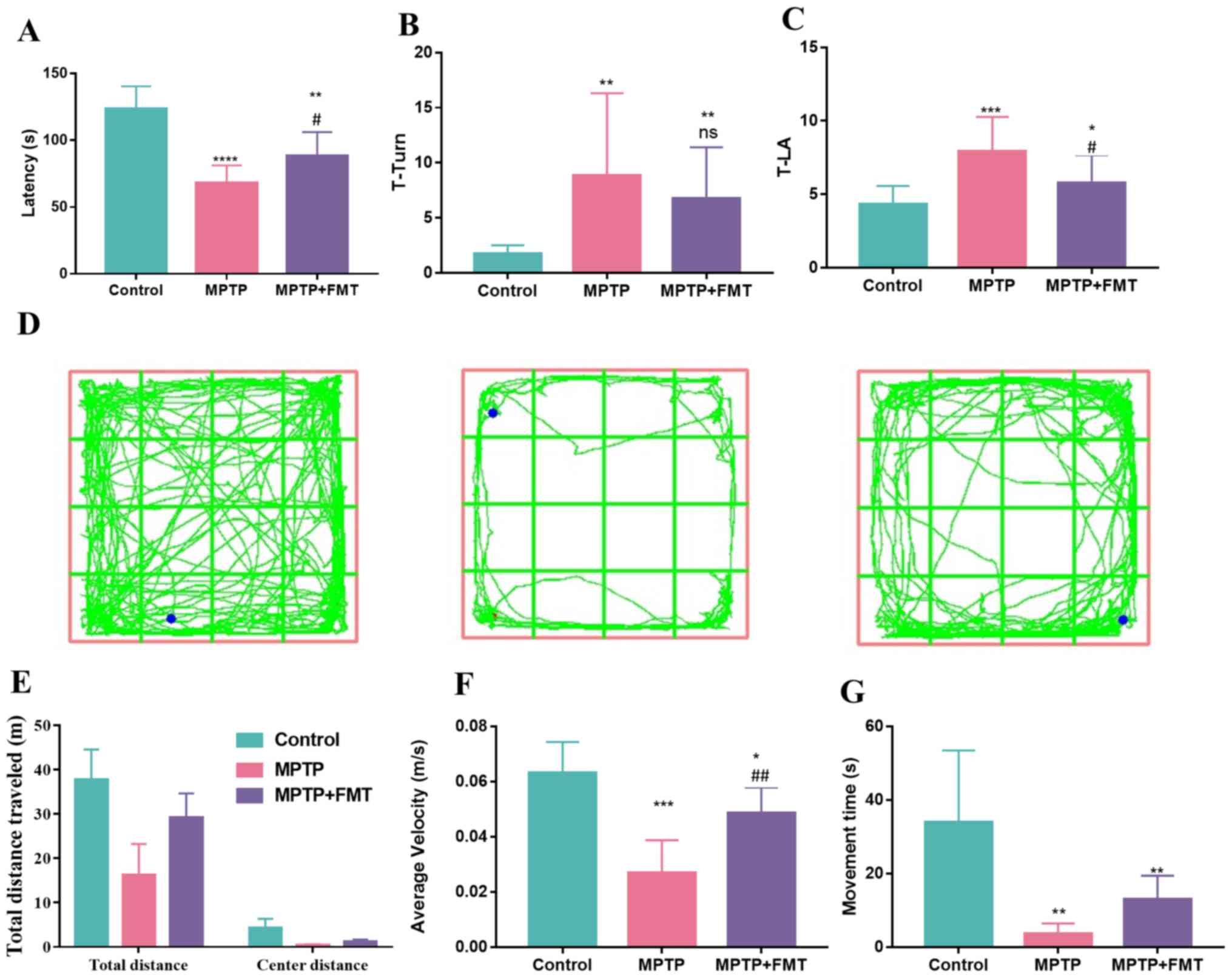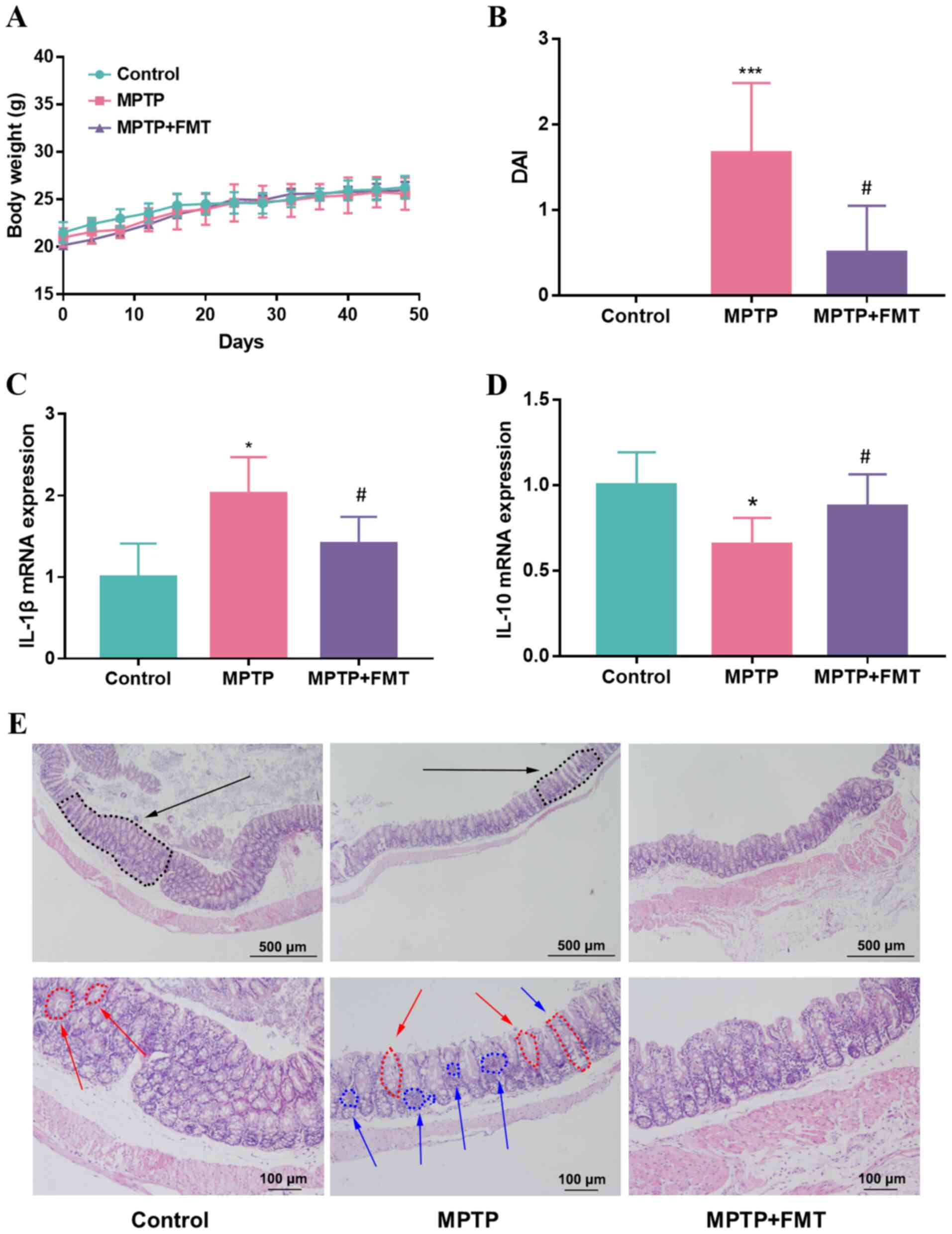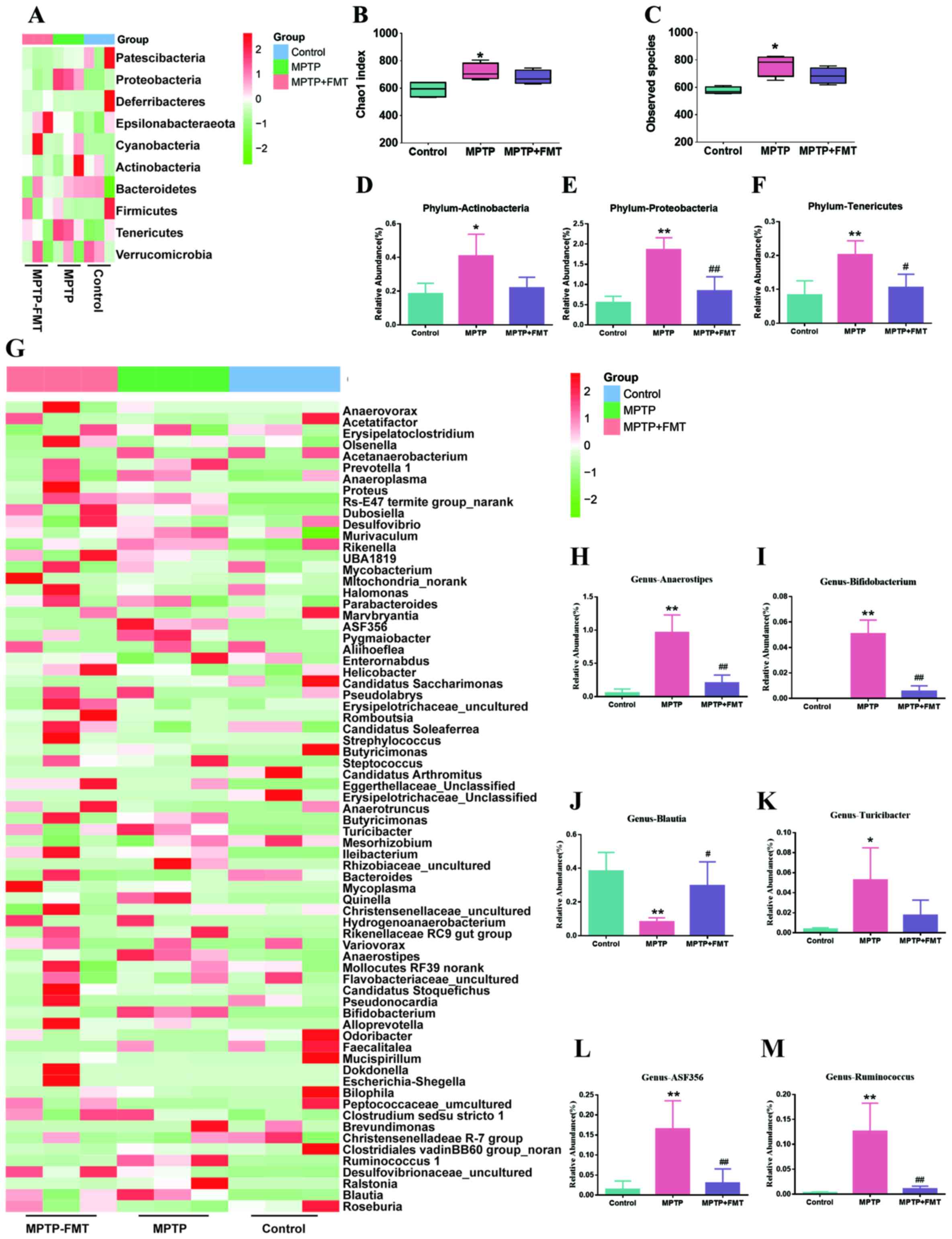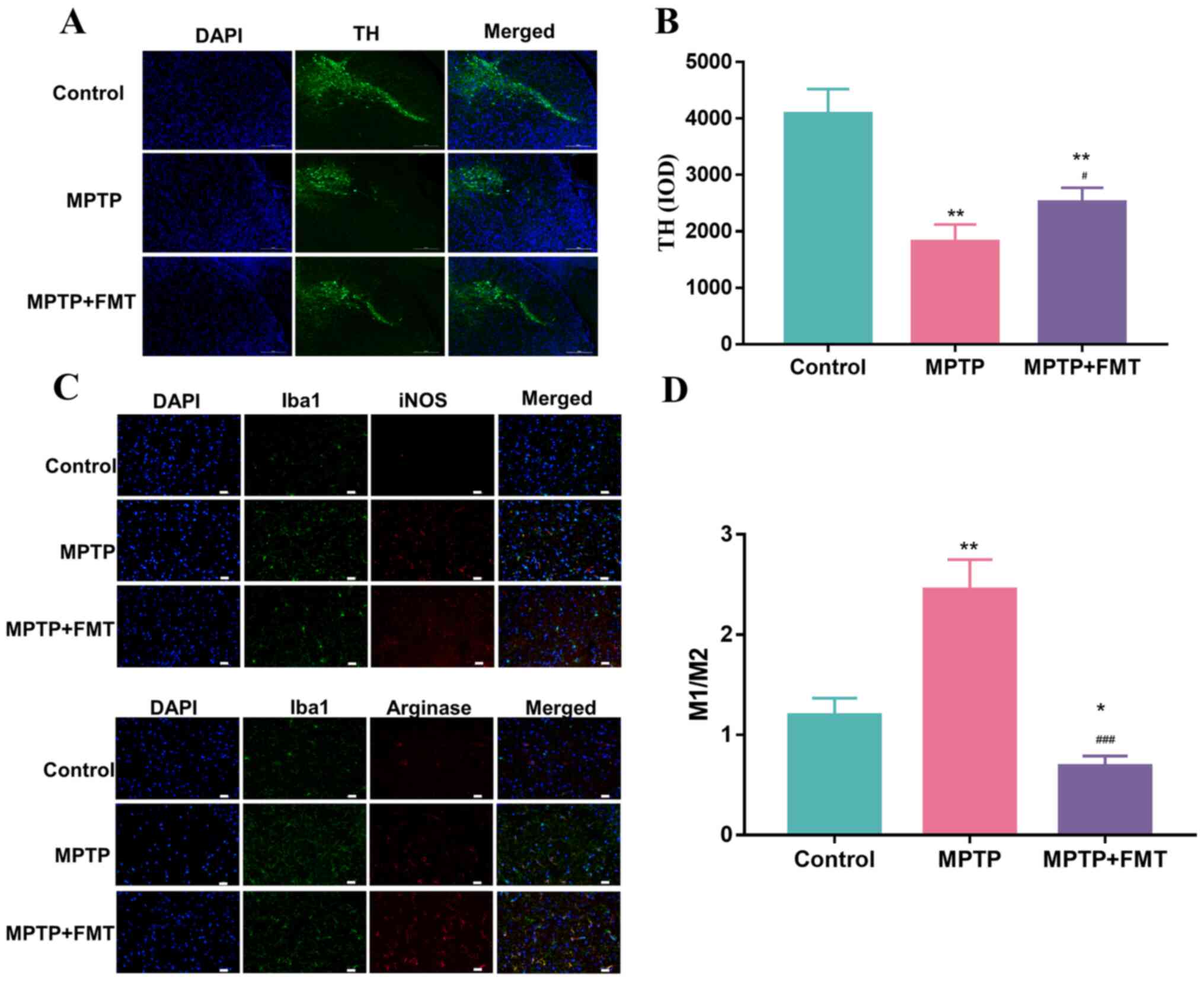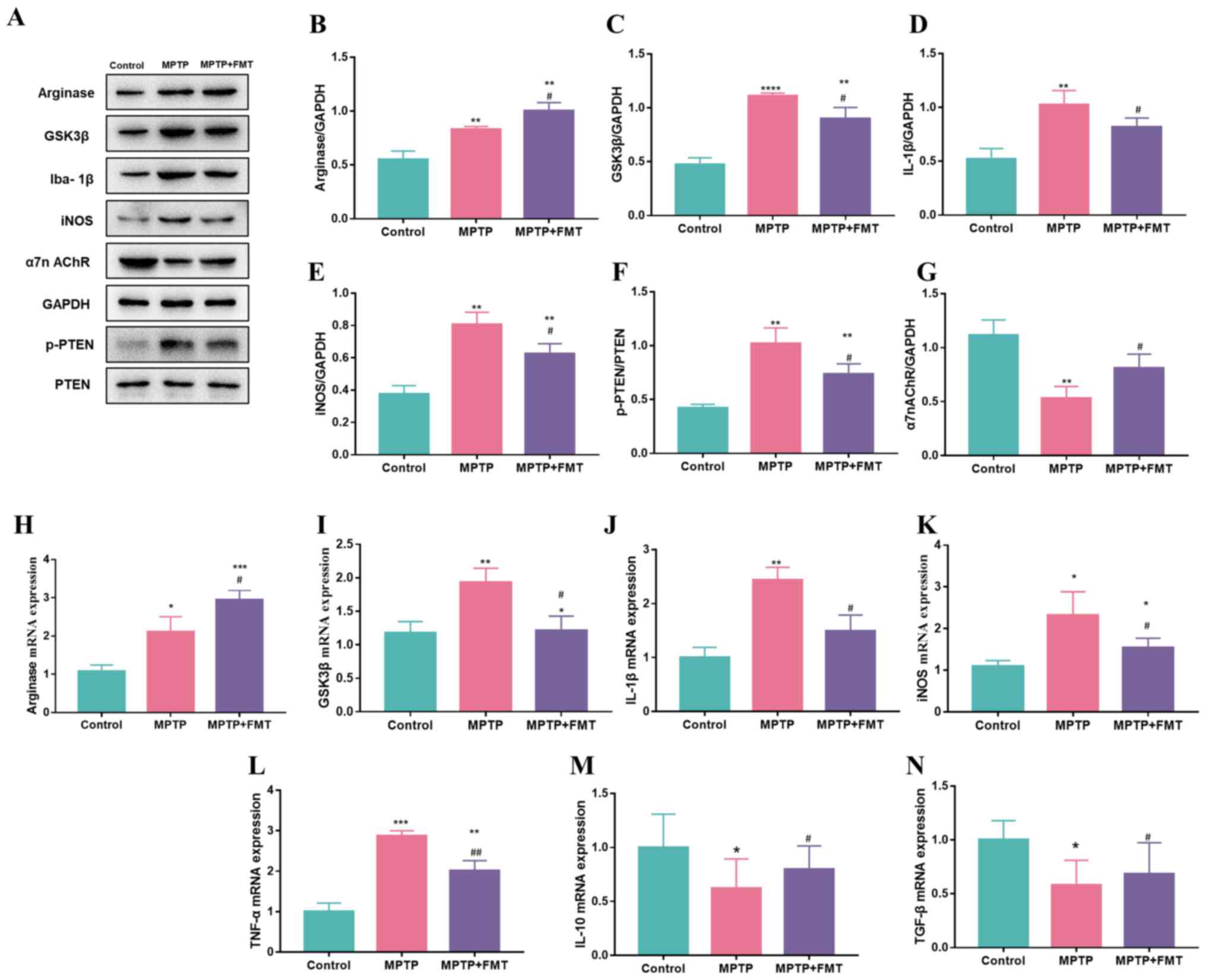|
1
|
Takahashi J: Clinical trial for
Parkinson's disease gets a green light in the US. Cell Stem Cell.
28:182–183. 2021.PubMed/NCBI View Article : Google Scholar
|
|
2
|
Ding XB, Wang XX, Xia DH, Liu H, Tian HY,
Fu Y, Chen YK, Qin C, Wang JQ, Xiang Z, et al: Impaired meningeal
lymphatic drainage in patients with idiopathic Parkinson's disease.
Nat Med. 27:411–418. 2021.PubMed/NCBI View Article : Google Scholar
|
|
3
|
Zhang J, Perry G, Smith MA, Robertson D,
Olson SJ, Graham DG and Montine TJ: Parkinson's disease is
associated with oxidative damage to cytoplasmic DNA and RNA in
substantia nigra neurons. Am J Pathol. 154:1423–1429.
1999.PubMed/NCBI View Article : Google Scholar
|
|
4
|
Waters CM, Peck R, Rossor M, Reynolds GP
and Hunt SP: Immunocytochemical studies on the basal ganglia and
substantia nigra in Parkinson's disease and Huntington's chorea.
Neuroscience. 25:419–438. 1988.PubMed/NCBI View Article : Google Scholar
|
|
5
|
Crowther RA, Daniel SE and Goedert M:
Characterisation of isolated α-synuclein filaments from substantia
nigra of Parkinson's disease brain. Neurosci Lett. 292:128–130.
2000.PubMed/NCBI View Article : Google Scholar
|
|
6
|
Bhattarai Y, Si J, Pu M, Ross OA, McLean
PJ, Till L, Moor W, Grover M, Kandimalla KK, Margolis KG, et al:
Role of gut microbiota in regulating gastrointestinal dysfunction
and motor symptoms in a mouse model of Parkinson's disease. Gut
Microbes. 13(1866974)2021.PubMed/NCBI View Article : Google Scholar
|
|
7
|
Zhong XH, Haycock JW, Shannak K,
Robitaille Y, Fratkin J, Koeppen AH, Hornykiewicz O and Kish SJ:
Striatal dihydroxyphenylalanine decarboxylase and tyrosine
hydroxylase protein in idiopathic Parkinson's disease and
dominantly inherited olivopontocerebellar atrophy. Mov Disord.
10:10–17. 1995.PubMed/NCBI View Article : Google Scholar
|
|
8
|
Zhong R, Chen Q, Zhang X, Li M and Lin W:
Helicobacter pylori infection is associated with a poor response to
levodopa in patients with Parkinson's disease: A systematic review
and meta-analysis. J Neurol: Feb 22, 2021 (Epub ahead of
print).
|
|
9
|
Schaeffer E, Vaterrodt T, Zaunbrecher L,
Liepelt-Scarfone I, Emmert K, Roeben B, Elshehabi M, Hansen C,
Becker S, Nussbaum S, et al: Effects of Levodopa on quality of
sleep and nocturnal movements in Parkinson's Disease. J Neurol.
268:2506–2514. 2021.PubMed/NCBI View Article : Google Scholar
|
|
10
|
Anwer S, Branchard E, Dan Q, Dan A and
Szaszi K: Tumor necrosis factor-α induces claudin-3 upregulation in
kidney tubular epithelial cells through NFκB and CREB1. Am J
Physiol Cell Physiol. 320:C495–C508. 2021.PubMed/NCBI View Article : Google Scholar
|
|
11
|
Corbo RM, Businaro R and Scarabino D:
Leukocyte telomere length and plasma interleukin-1β and
interleukin-18 levels in mild cognitive impairment and Alzheimer's
disease: New biomarkers for diagnosis and disease progression?
Neural Regen Res. 16:1397–1398. 2021.PubMed/NCBI View Article : Google Scholar
|
|
12
|
Carabotti M, Scirocco A, Maselli MA and
Severi C: The gut-brain axis: Interactions between enteric
microbiota, central and enteric nervous systems. Ann Gastroenterol.
28:203–209. 2015.PubMed/NCBI
|
|
13
|
Cryan JF, O'Riordan KJ, Sandhu K, Peterson
V and Dinan TG: The gut microbiome in neurological disorders.
Lancet Neurol. 19:179–194. 2020.PubMed/NCBI View Article : Google Scholar
|
|
14
|
Shen L: Gut, oral and nasal microbiota and
Parkinson's disease. Microb Cell Fact. 19(50)2020.PubMed/NCBI View Article : Google Scholar
|
|
15
|
Moustafa SA, Mohamed S, Dawood A, Azar J,
Elmorsy E, Rizk NAM and Salama M: Gut brain axis: An insight into
microbiota role in Parkinson's disease. Metab Brain Dis.
36:1545–1557. 2021.PubMed/NCBI View Article : Google Scholar
|
|
16
|
Heintz-Buschart A, Pandey U, Wicke T,
Sixel-Döring F, Janzen A, Sittig-Wiegand E, Trenkwalder C, Oertel
WH, Mollenhauer B and Wilmes P: The nasal and gut microbiome in
Parkinson's disease and idiopathic rapid eye movement sleep
behavior disorder. Mov Disord. 33:88–98. 2018.PubMed/NCBI View Article : Google Scholar
|
|
17
|
Cirstea MS, Yu AC, Golz E, Sundvick K,
Kliger D, Radisavljevic N, Foulger LH, Mackenzie M, Huan T, Finlay
BB, et al: Microbiota composition and metabolism are associated
with gut function in Parkinson's disease. Movement Disord.
35:1208–1217. 2020.PubMed/NCBI View Article : Google Scholar
|
|
18
|
Zhang F, Cui B, He X, Nie Y, Wu K and Fan
D: FMT-standardization Study Group. Microbiota transplantation:
concept, methodology and strategy for its modernization. Protein
Cell. 9:462–473. 2018.PubMed/NCBI View Article : Google Scholar
|
|
19
|
Xue LJ, Yang XZ, Tong Q, Shen P, Ma SJ, Wu
SN, Zheng JL and Wang HG: Fecal microbiota transplantation therapy
for Parkinson's disease: A preliminary study. Medicine (Baltimore).
99(e22035)2020.PubMed/NCBI View Article : Google Scholar
|
|
20
|
Zha Z, Lv Y, Tang H, Li T, Miao Y, Cheng
J, Wang G, Tan Y, Zhu Y, Xing X, et al: An orally administered
butyrate-releasing xylan derivative reduces inflammation in dextran
sulphate sodium-induced murine colitis. Int J Biol Macromol.
156:1217–1233. 2020.PubMed/NCBI View Article : Google Scholar
|
|
21
|
Wang Y, Wei N and Li X: Preclinical
evidence and possible mechanisms of baicalein for rats and mice
with Parkinson's disease: A systematic review and meta-analysis.
Front Aging Neurosci. 12(277)2020.PubMed/NCBI View Article : Google Scholar
|
|
22
|
Guo HM, Zhou ZY, Huang YQ, Li X and Wang
XJ: Investigation of the roles of dysbindin-1 and SATB2 in the
progression of Parkinson's disease. Eur Rev Med Pharmacol Sci.
23:7510–7516. 2019.PubMed/NCBI View Article : Google Scholar
|
|
23
|
Li L, Chen Y, Tang J and Yuan L:
Evaluation of efficiency omega 3 fatty acid improves the
behavioural phenotype and protects against oxidative stress against
MPP+ induces Parkinson's disease in mice. Pak J Pharm
Sci. 34:861–867. 2021.PubMed/NCBI
|
|
24
|
Koentjoro B, Park J-S and Sue CM: Parkin
western blotting is useful for identification of patients with
Parkin-related Parkinson's disease. J Neurol Neurosurg Psychiatry.
85:1436–1437. 2014.PubMed/NCBI View Article : Google Scholar
|
|
25
|
Oluwole OG, Kuivaniemi H, Abrahams S,
Haylett WL, Vorster AA, van Heerden CJ, Kenyon CP, Tabb DL, Fawale
MB, Sunmonu TA, et al: Targeted next-generation sequencing
identifies novel variants in candidate genes for Parkinson’s
disease in Black South African and Nigerian patients. BMC Med
Genet. 21(23)2020.PubMed/NCBI View Article : Google Scholar
|
|
26
|
Illumina Inc: 16S Metagenomic Sequencing
Library Preparation, 2013. https://support.illumina.com/content/dam/illumina-support/documents/documentation/chemistry_documentation/16s/16s-metagenomic-library-prep-guide-15044223-b.pdf.
Accessed, April 15, 2020.
|
|
27
|
Livak KJ and Schmittgen TD: Analysis of
relative gene expression data using real-time quantitative PCR and
the 2(-Delta Delta C(T)) Method. Methods. 25:402–408.
2001.PubMed/NCBI View Article : Google Scholar
|
|
28
|
Hamilton MJ, Weingarden AR, Sadowsky MJ
and Khoruts A: Standardized frozen preparation for transplantation
of fecal microbiota for recurrent Clostridium difficile infection.
Am J Gastroenterol. 107:761–767. 2012.PubMed/NCBI View Article : Google Scholar
|
|
29
|
Wlodarska M, Thaiss CA, Nowarski R,
Henao-Mejia J, Zhang JP, Brown EM, Frankel G, Levy M, Katz MN,
Philbrick WM, et al: NLRP6 inflammasome orchestrates the colonic
host-microbial interface by regulating goblet cell mucus secretion.
Cell. 156:1045–1059. 2014.PubMed/NCBI View Article : Google Scholar
|
|
30
|
Zhang L, Zhang L, Li Y, Li L, Melchiorsen
JU, Rosenkilde M and Hölscher C: The novel dual GLP-1/GIP receptor
agonist DA-CH5 is superior to single GLP-1 receptor agonists in the
MPTP model of Parkinson's disease. J Parkinsons Dis. 10:523–542.
2020.PubMed/NCBI View Article : Google Scholar
|
|
31
|
Li W, Wu X, Hu X, Wang T, Liang S, Duan Y,
Jin F and Qin B: Structural changes of gut microbiota in
Parkinson's disease and its correlation with clinical features. Sci
China Life Sci. 60:1223–1233. 2017.PubMed/NCBI View Article : Google Scholar
|
|
32
|
Bedarf JR, Hildebrand F, Coelho LP,
Sunagawa S, Bahram M, Goeser F, Bork P and Wüllner U: Functional
implications of microbial and viral gut metagenome changes in early
stage L-DOPA-nave Parkinson's disease patients. Genome Med.
9(39)2017.PubMed/NCBI View Article : Google Scholar
|
|
33
|
Hill-Burns EM, Debelius JW, Morton JT,
Wissemann WT, Lewis MR, Wallen ZD, Peddada SD, Factor SA, Molho E,
Zabetian CP, et al: Parkinson's disease and Parkinson's disease
medications have distinct signatures of the gut microbiome. Mov
Disord. 32:739–749. 2017.PubMed/NCBI View Article : Google Scholar
|
|
34
|
Zhou ZL, Jia XB, Sun MF, Zhu YL, Qiao CM,
Zhang BP, Zhao LP, Yang Q, Cui C, Chen X, et al: Neuroprotection of
fasting mimicking diet on MPTP-induced Parkinson's disease mice via
gut microbiota and metabolites. Neurotherapeutics. 16:741–760.
2019.PubMed/NCBI View Article : Google Scholar
|
|
35
|
Sun B-L, Li W-W, Wang J, Xu YL, Sun HL,
Tian DY, Wang YJ and Yao XQ: Gut microbiota alteration and its time
course in a tauopathy mouse model. J Alzheimers Dis. 70:399–412.
2019.PubMed/NCBI View Article : Google Scholar
|
|
36
|
Nagalingam NA, Kao JY and Young VB:
Microbial ecology of the murine gut associated with the development
of dextran sodium sulfate-induced colitis. Inflamm Bowel Dis.
17:917–926. 2011.PubMed/NCBI View Article : Google Scholar
|
|
37
|
Scheperjans F, Aho V, Pereira PAB,
Koskinen K, Paulin L, Pekkonen E, Haapaniemi E, Kaakkola S,
Eerola-Rautio J, Pohja M, et al: Gut microbiota are related to
Parkinson's disease and clinical phenotype. Mov Disord. 30:350–358.
2015.PubMed/NCBI View Article : Google Scholar
|
|
38
|
Huang H, Xu H, Luo Q, He J, Li M, Chen H,
Tang W, Nie Y and Zhou Y: Fecal microbiota transplantation to treat
Parkinson's disease with constipation: A case report. Medicine
(Baltimore). 98(e16163)2019.PubMed/NCBI View Article : Google Scholar
|
|
39
|
Dutta SK, Verma S, Jain V, Surapaneni BK,
Vinayek R, Phillips L and Nair PP: Parkinson's disease: The
emerging role of gut dysbiosis, antibiotics, probiotics, and fecal
microbiota transplantation. J Neurogastroenterol Motil. 25:363–376.
2019.PubMed/NCBI View Article : Google Scholar
|
|
40
|
Lubomski M, Tan AH, Lim SY, Holmes AJ,
Davis RL and Sue CM: Parkinson's disease and the gastrointestinal
microbiome. J Neurol. 267:2507–2523. 2020.PubMed/NCBI View Article : Google Scholar
|
|
41
|
Haavik J and Toska K: Tyrosine hydroxylase
and Parkinson's disease. Mol Neurobiol. 16:285–309. 1998.PubMed/NCBI View Article : Google Scholar
|
|
42
|
Kitamura Y, Sakanashi M, Ozawa A, Saeki Y,
Nakamura A, Hara Y, Saeki KI and Arimoto-Kobayashi S: Protective
effect of Actinidia arguta in MPTP-induced Parkinson's disease
model mice. Biochem Biophys Res Commun. 555:154–159.
2021.PubMed/NCBI View Article : Google Scholar
|
|
43
|
da Silva WAB, Ferreira Oliveira K,
Caroline Vitorino L, Ferreira Romão L, Allodi S and Lourenço Correa
C: Physical exercise increases the production of tyrosine
hydroxylase and CDNF in the spinal cord of a Parkinson's disease
mouse model. Neurosci Lett. 760(136089)2021.PubMed/NCBI View Article : Google Scholar
|
|
44
|
Wang Y, Li M, Song M, Xu X, Xiong J, Yang
X, Tan J and Bai Y: Expression of OX40 ligand in microglia
activated by IFN-gamma sustains a protective CD4+ T-cell
response in vitro. Cell Immunol. 251:86–92. 2008.PubMed/NCBI View Article : Google Scholar
|
|
45
|
Utz SG, See P, Mildenberger W, Thion MS,
Silvin A, Lutz M, Ingelfinger F, Rayan NA, Lelios I, Buttgereit A,
et al: Early fate defines microglia and non-parenchymal brain
macrophage development. Cell. 181:557–573.e18. 2020.PubMed/NCBI View Article : Google Scholar
|
|
46
|
Kam TI, Hinkle JT, Dawson TM and Dawson
VL: Microglia and astrocyte dysfunction in parkinson's disease.
Neurobiol Dis. 144(105028)2020.PubMed/NCBI View Article : Google Scholar
|
|
47
|
Joers V, Masilamoni G, Kempf D, Weiss AR,
Rotterman TM, Murray B, Yalcin-Cakmakli G, Voll RJ, Goodman MM,
Howell L, et al: Microglia, inflammation and gut microbiota
responses in a progressive monkey model of Parkinson's disease: A
case series. Neurobiol Dis. 144(105027)2020.PubMed/NCBI View Article : Google Scholar
|
|
48
|
Hefazi M, Patnaik MM, Hogan WJ, Litzow MR,
Pardi DS and Khanna S: Safety and efficacy of fecal microbiota
transplant for recurrent clostridium difficile infection in
patients with cancer treated with cytotoxic chemotherapy: A
single-institution retrospective case series. Mayo Clin Proc.
92:1617–1624. 2017.PubMed/NCBI View Article : Google Scholar
|
|
49
|
Porcu F, Rubio A, Pérez-Hernández M and
Gutiérrez-López MD: Effect of intensive and repeated use of ethanol
on the integrity of blood-brain barrier in mouse brain. Role of
toll-like receptor 4 (TLR4). Basic Clin Pharmacol Toxicol.
115(41)2014.PubMed/NCBI View Article : Google Scholar
|
|
50
|
Cao L, Liu C, Wang F and Wang H: SIRT1
negatively regulates amyloid-beta-induced inflammation via the
NF-κB pathway. Braz J Med Biol Res. 46:659–669. 2013.PubMed/NCBI View Article : Google Scholar
|















